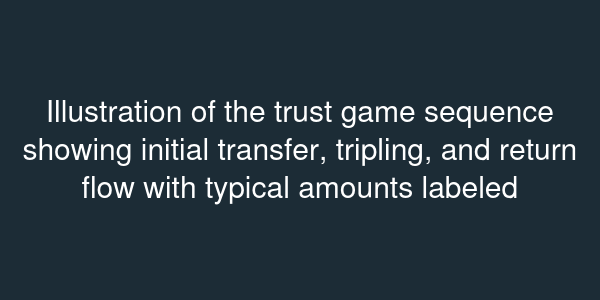Reciprocity and Trust
Essential Questions
- What do trust games teach us about reciprocity?
- How do reciprocity and trust change optimal contracts?
- How can institutions cultivate trust to improve outcomes?
Overview
Picture a supply-chain partnership. A manufacturer must decide whether to invest in quality before a retailer commits to future orders. Contracts cannot specify every detail, so trust matters. Behavioral game theory studies reciprocity—the tendency to reward kindness and punish betrayal—even when it is costly.
This lesson explores trust games, summarizes empirical findings on reciprocity, and shows how relational contracts and reputation sustain cooperation.
The Trust Game
In the trust game, Player A (investor) receives and can send any amount to Player B (trustee). The amount sent is tripled. Player B then chooses how much to return. Standard theory predicts A sends because B has incentives to keep everything. Experiments prove otherwise: average transfers are over half the endowment, and B typically returns a fair share. Reciprocity emerges because B rewards trust, and A anticipates it.

Modeling Reciprocity
Economists capture reciprocity by augmenting utility with kindness terms. Rabin's fairness equilibrium model defines a "kindness" function measuring how player perceives player 's action relative to a fair reference. Player 's utility becomes , where measures reciprocity strength. Positive implies mutual kindness yields extra utility, sustaining cooperative outcomes.
In incomplete contracts, relational models assume future interactions and reputation. Suppose effort increases joint surplus but is costly to the agent. The principal promises a discretionary bonus if effort appears high. If trust is broken, future cooperation ends, giving both parties incentives to reciprocate. The trigger strategy payoff is , where is the continuation probability. Cooperation holds if the present gain from cheating is less than the discounted future loss.
Institutions of Trust
Microfinance relies on group lending, where peers monitor each other. Reciprocity ensures timely repayment. Online platforms use ratings to build trust. Public policy invests in legal infrastructure and anti-corruption measures to reduce the cost of trusting strangers.
Designers can signal trustworthiness through transparency, warranties, and shared governance. Understanding reciprocity helps you predict when economic relationships thrive on goodwill and when formal enforcement is required.